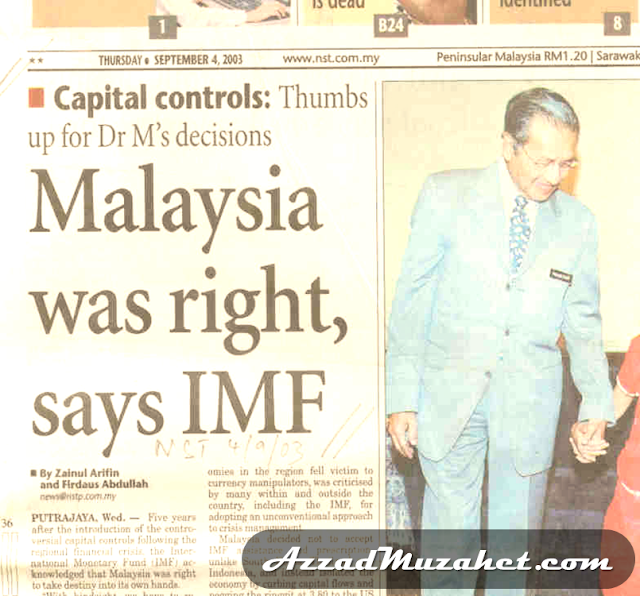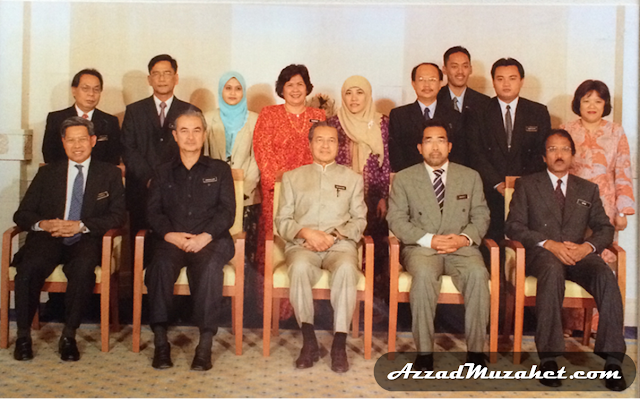Special Interview with Dr. Muzahet
3 August 2016, updated 1 Jan 2018Azzad: Dad, you teach economics for MBA right, what’s your view of our current economy?
Dad: Well In my opinion, our economy has been growing on average about 4% from 2008 until 2016, which is relatively low. The point to be highlighted here is that this slow growth has been prolonged for the past 8 years when we were beginning to feel the heat of global economic crisis in 2008. Until now there is no indications that our economy will achieve higher growth.
Azzad: Do you think our economy will recover from the global crisis?
Dad: Not in the near future. It is unlikely that we will achieve higher growth like we had before, where our growth performance was high, averaging 7.4% in 1980s and 9.1% for the period 1991-1997, before the Asian Financial Crisis 1997/98. That’s why we have Vision 2020 during that time and with the stable growth, we assumed that the target to be a developed nation, as stated in the Vision will be achieved.
Dad: No pragmatic measures have been taken so far to realign our economy back to its original path. We've sort of lost our strength to handle the crisis and the ability to better manage the economy.
Azzad: Isn't there already ‘think-tanks’ that help to manage our economy in a better way??
Dad: We normally refer ‘think-tank’ as a group of people who are able to give ideas and offer recommendations on a particular subject matter. But in reality, this kind of ‘think-tank’ doesn’t work. For example, the Government had established the National Economic Advisory Council on 9 April 2009 to deal with the effects of the recession. But the Council was unable to function and the economy continued to register slow growth after almost 10 years of its establishment.
Azzad: What should a ‘think-tank’ be like then?
Dad: We had established Majlis Tindakan Ekonomi Negara (MTEN) or National Economic Action Council (NEAC) when our economy was adversely affected during the Asian Financial Crisis in 1997/98. Now that's what you call a ‘think-tank’ and it was very effective. Measures taken by the MTEN had quickly brought back our economy which plunged into a negative growth -7.4% in 1998 to a positive growth of 6.1% in 1999 and 8.5% in 2000. We managed to recover our economy just within a year!
 |
| Malaysia was right says IMF, NST 4th September 2003 |
Azzad: Wow!! That’s tremendous, kudos to MTEN!!
Dad: Not only that. The International Monetary Fund (IMF) who was once skeptical with the measures taken by MTEN, which contradicted economics theory and conventional doctrine, has openly acknowledged that Malaysia had handled the 1997/98 regional financial crisis the right way.
Azzad: What made MTEN become so effective as a ‘think-tank’?
Dad: The ‘Think-tank’ concept in MTEN at the time is not referring to a small group of people who only highlighted issues and offer recommendations. Rather, it is an affiliated entity represented by leaders from respective positions in the government establishments.
On top of the hierarchy was the ‘Council’, chaired by our PM at that time, Tun Mahathir and the members include a number of Senior Ministers, Menteri Besar and Chief Ministers.
 |
| The ‘think-tank’ structure in MTEN |
The second level was ‘EXCO MTEN’, also chaired by the PM with members including the Finance Minister, an Economic Minister, the Governor of Bank Negara, Director General of EPU and a professional from the private sector. EXCO MTEN meets every day, except Wednesdays and public holidays to examine and make decision on recommendations proposed by the Working Group.
The Working Group was chaired by MTEN’s CEO, Tun Daim – it comprised of 4 members from academicians and professionals who regularly meet the captains of industry to identify issues, problems and recommendations to help the affected sectors in the economy, and MTEN Secretariat, who prepare policy papers based on the issues, problems and recommendations from the Working Group to be tabled to EXCO MTEN for quick decisions.
 |
| MTEN’s CEO, Tun Daim Zainuddin showing the report on ‘National Economic Recovery Plan’ document |
 |
The National
Economic Recovery Plan, containing 252 pages outlines the Agenda for Action
|
 |
| Secretariat, Majlis Tindakan Ekonomi Negara (MTEN) 2003 |
For me, MTEN was a true ‘think-tank’ that was very effective in managing the economy during the economic crisis back in 1997/98.
Azzad: Does MTEN still exist now?
Dad: Unfortunately, after Tun Mahathir announced his retirement as the Prime Minister on 31 October 2003, MTEN was neglected. The new premiership was not interested in utilizing MTEN in managing the nation’s economic agenda. Since then, MTEN was slowly dying off and the government officers who were seconded to MTEN before, mostly from EPU, were transferred back to their respective agencies.
Dad stopped talking at this juncture. He looked rather sad and disappointed. I could imagine his feelings after he mentioned MTEN was neglected and the officers were sent back to their previous offices. He spent 8 years of his working days in MTEN and was among the earliest officers from EPU who were seconded to MTEN Secretariat to help the necessary documentations for the establishment and the running of the ‘think-tank’.
I’ll persuade him to talk more about the current economic scenario which has been dragged under a slow growth for already 8 years now without concerted efforts and measures to stimulate the economy such as what had been done by MTEN previously. To be continued...
Dr. Muzahet Masruri, Ph.D (Economics), University of East Anglia, United Kingdom
Dr. Muzahet Masruri, Ph.D (Economics), University of East Anglia, United Kingdom






















